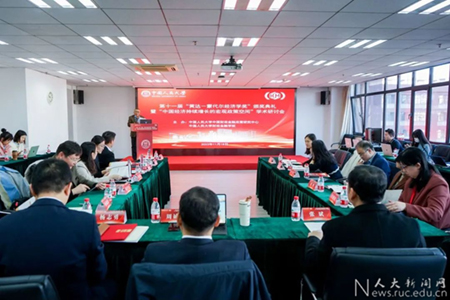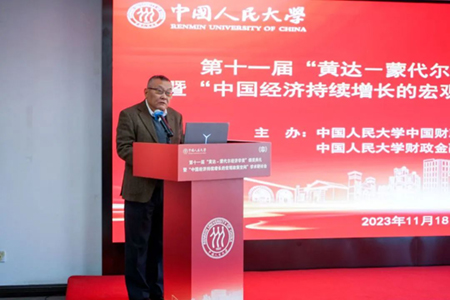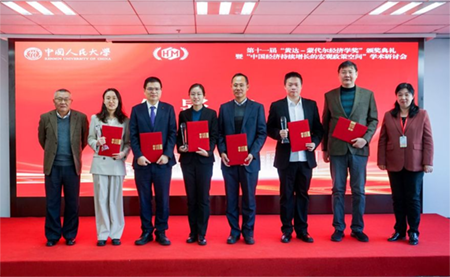The 11th Mundell-Huang Prize awarding ceremony and the academic seminar themed “Macropolicy for China’s sustained economic growth” were held on November 18 at Renmin University of China (RUC). The activities are co-sponsored by the School of Finance and China Financial Policy Research Center of RUC. Professor Qu Qiang, Diector of China Financial Policy Research Center presided over the activities.

Qu Qiang congratulated the winners of the 11th Mundell-Huang Prize. Founded in 2002, the Prize is a nationally academic award jointly named by Robert A. Mundell, who won the Nobel Economics Prize in 1999, and Huang Da, a renowned Chinese economist and former president of RUC. Qu said that the Mundell-Huang Prize is committed to expanding the depth and breadth of economic theoretical research and inspiring young scholars to make contributions to the cause of China’s economic reform and development as well as the teaching and research of the discipline. In the past 10 selections, 35 young scholars from universities and institutes in China have won the Prize.

Zhuang Yumin, Dean of the School of Finance, presented awards to the winners and their mentors. Cao Jing from University of International Business and Economics, Sun Yuchen from Renmin University of China and Zhang Longtian from Tsinghua University won the 11th Mundell-Huang Prize for their doctoral disserations. Their mentors, Professor Yang Zhiyong, Professor Zhang Chengsi and Associate Professor Xie Danxia, won the Honorary mentor Award.

Then, the winners and their mentors delivered speeches. Cao Jing thanked the teachers who helped her in academic researches. She said that she would regard this award as a starting point, and strive to achieve more research fruits in the field of finance. Cao’s mentor Yang Zhiyong expressed his respect for Huang Da and Mundell. He called on more young scholars to contribute their wisdom to the Chinese modernization. Sun Yuchen thanked his Alma mater for training him. She said that he would continue to use Chinese data to tell Chinese stories and contribute to the construction of China. Sun’s mentor Zhang Chengsi encouraged the students to work hard and make more contributions to the country and the economy. Zhang Longtian shared his research process in digital economy and economic growth. He said that he will continue to deepen his research to provide more policy insights. Zhang’s mentor Xie Danxia hoped that the students could contribute their wisdom to the national and world economics.
In the following academic seminar on “Macropolicy for China’s sustained economic growth”, Zhou Chengjun, Director of Financial Research Institute of the People's Bank of China, and Zhang Bin, Deputy Director of Finance and Taxation Research Center of the Chinese Academy of Social Sciences, delivered keynote speeches. Three winners and three teachers from the School of Finance had an academic discussion.
Zhou Chengjun remained optimistic about the medium and long term development of China’s economy. He stressed that the future research should focus on how to accurately define the climax of “carbon peak”.
Zhang Bin analyzed the evolution of China’s macro economy from 2000 to 2022. He pointed out that the current growth momentum and demand structure have changed, thus the tax and fee reduction should focus on long-term development.
Cao Jing stressed that the core of stabilizing economic growth and preventing risks lies in solving the debt of local government. Thus it is important to manage the relationship between government debt and economic growth.
Sun Yuchen analyzed the enterprises’ perception of monetary policy. She stressed that to promote the effective conduction of monetary policy, the central bank should pay more attention to the formation and change of enterprise expectations.
Zhang Longtian stressed the role that data plays in innovation. He said that policymakers should properly address the relationship between protecting people’s privacy and future economic growth.
Professor Song Ke believes that digital currency and cash will coexist in the market due to reasons such as anonymity and Chinese traditional culture. He also analyzed the positive effect of digital currency on central bank’s negative interest rate policy after it completely replaced cash.
Professor Zhang Jing pointed out that differentiated policies targeted at different income groups can improve the overall social welfare. Her research suggested that high-income people tend to spend more in home appliances, cars and housing, so providing credit support to them can boost domestic demand.
Lecturer Wang Chenxi focused on the impact of RMB on commodity trading, foreign exchange settlement and reserve management. He stressed that the internalization of RMB could benefit China’s economic growth.
After discussion, Qu Qiang made a concluding speech. He once again thanked all the guests for coming and expressed his heartfelt congratulations to the three winners.



